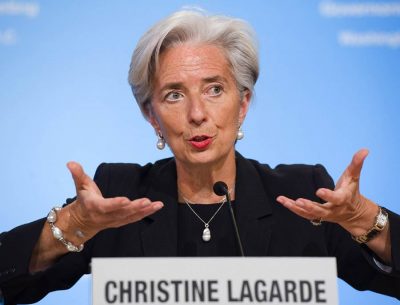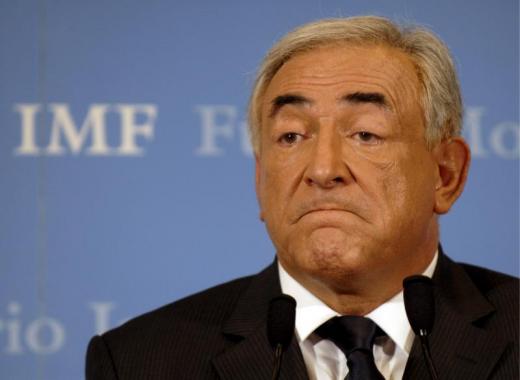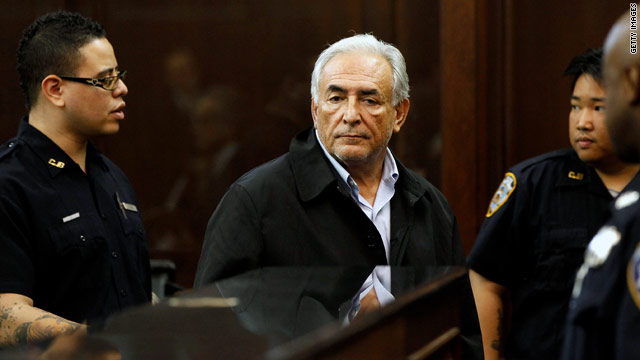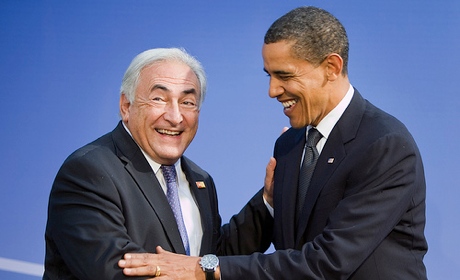Eight Years Ago: Regime Change at the IMF: Christine Lagarde and The Frame-Up of Dominique Strauss-Kahn

This article was first published on May 19, 2011.
Author’s Note and Update
In recent developments, Ms. Christine Lagarde, Managing Director of the IMF is slated to become the next president of the European Central Bank (ECB). France’s president Emmanuel Macron acting on behalf of powerful banking interests was instrumental in Ms. Lagarde’s candidacy.
What media reports fail to mention is that Lagarde is a corrupt official involved in financial fraud. Her appointment to head the ECB is not matter of political debate or concern. She is an obedient instrument of the financial and banking establishment which controls both the IMF and the European Central Bank.
On December 20, 2016, A French court found IMF Managing Director Christine Lagarde guilty of “negligence” in relation to a multimillion dollar Euro fraud while she was France’s finance minister in 2008. She is said to have approved “an award of €404m ($429m; £340m) transfer to businessman Bernard Tapie, [a crony of president Sarkozy] for the disputed sale of a firm.”
“Ms Lagarde, who always denied wrongdoing, was not present in court, having left Paris for Washington DC.”
The IMF board said it retained “full confidence” in her leadership. (BBC, December 20, 2016)
No questions asked: Despite her involvement in financial fraud at tax payers’ expense, the French government at the time confirmed that they had full confidence in Ms. Lagarde.
Her leadership as head of the IMF has not been questioned. Christine Lagarde was reappointed in February 2016 to a second five-year term at the IMF.
Despite her record, she is now considered (July 2019) for the position of president of the European Central Bank (ECB).
Eight years ago, Flashback to May-June 2011. The Dominique Strauss Khan (DSK) Honey Trap Scandal was instrumental in Lagarde’s accession to the IMF. And her role in the Euro 400 million financial transfer was casually ignored.
Regime Change: Dominque Strauss Khan (DSK), managing director of the IMF was framed and Christine Lagarde was appointed to replace him.
Media focus at the time centered on the story of the alleged victim, the hotel housemaid, rather than on who was pulling the strings behind the scenes in what visibly was a political frame-up.
There was no firm evidence against Strauss-Kahn. This was known to prosecutors at an early stage of the investigation. Had they released it, Lagarde would not have been chosen to replace DSK.
France’s Finance Minister Christine Lagarde was confirmed as Managing Director of the IMF on June 26th 2016. The report from the prosecutor was released to the media three days later, on June 29.
Lagarde was chosen to succeed Strauss Khan at the IMF, a few days prior to a New York Court ruling which completely exonerated Dominique Strauss Khan on the basis of lack of evidence.
If this information had been revealed a few days earlier, Lagarde’s candidacy would no doubt have been questioned.
Regime change was implemented at the IMF, not to mention preparations for the French presidential elections.
While Strauss Khan was dismissed following the 2011 scandal (despite the ruling of the New York court case which abandoned all charges again him) the 2008 financial scam involving Christine Lagarde was known to the French government. This however did not prevent her 2011 June appointment to the IMF.
Needless to say, not only did she retain her position at the IMF despite having been involved in a financial scam, she was appointed for a second term.
The appointment of Christine Lagarde in 2011 marks a major political turning point. Since the DSK affair, Europe’s political landscape has become increasingly pro-American.
The Washington consensus prevails. The application of IMF economic medicine had already been applied in several EU countries including Greece and Portugal during DSK’s mandate. But in the course of the last few years, it has reached new heights. Drastic austerity measures have triggered unprecedented levels of unemployment. The entire European social landscape is in crisis.
In many regards the DSK scandal was a watershed in the evolution of EU-US relations, with European governments becoming increasingly subservient to Washington’s demands.
Regime Change at the IMF. The Obama administration had demanded DSK’s replacement by a more compliant individual.
In retrospect, the framing of Strauss Kahn and the appointment of Lagarde had an impact not only on EU economic restructuring including the crisis in Greece, but also on the State structures of the French Republic.
The “Honey Trap” is a powerful instrument. Had DSK not been framed, Francois Hollande — who largely served US interests– would no doubt not have been elected president of the French Republic and Christine Lagarde would not have acceded to the positon of Managing Director if the IMF.
Michel Chossudovsky, February 27, 2o15, December 21, 2016, July 3, 2019
* * *
Regime Change at the IMF: The Frame-Up of Dominique Strauss-Kahn
by Michel Chossudovsky
Global Research, 19 May 2011
The arrest of IMF Managing Director Dominique Strauss-Kahn has all the appearances of a frame-up ordered by powerful members of the financial establishment, in liaison with France’s Nicolas Sarkozy, whose presidency has served the interests of the US at the expense of those of France and the European Union. While there is for the moment no proof of a plot, the unusual circumstances of his arrest and imprisonment require careful examination.
Immediately following Strauss Kahn’s arrest, pressures were exerted by Washington to speed up his replacement as Managing Director of the IMF preferably by a non-European, an American or a handpicked candidate from an “emerging market economy” or a developing country.
Since the founding of the Bretton Woods institutions in 1945, the World Bank has been headed by an American whereas the IMF has been under the helm of a (Western) European.
Strauss-Kahn is a member of elite groups who meet behind closed doors. He belongs to the Bildeberger. Categorized as one of the world’s most influential persons, he is an academic and politician rather than a banker. In contrast to his predecessors at the IMF, he has no direct affiliation to a banking or financial institution.
But at the same time he is the fall guy. His “gaffe” was to confront the Washington-Wall Street Consensus and push for reforms within the IMF, which challenged America’s overriding role within the organization.
The demise of Strauss-Kahn potentially serves to strengthen the hegemony of the US and its control over the IMF at the expense of what former Defense Secretary Donald Rumsfeld called “Old Europe”.

Blocking Strauss-Kahn, the Presidential Candidate
In recent years, a major shift has occurred in Europe’s political landscape. Pro-American governments have been elected in both France and Germany. Social Democracy has been weakened.
Franco-American relations have been redefined, with Washington playing a significant role in grooming a new generation of European politicians.
The presidency of Nicolas Sarkozy has, in many regards, become a de facto US “client regime”, broadly supportive of US corporate interests in the EU and closely aligned with US foreign policy.
There are two overlapping and interrelated issues in the DSK frame-up hypothesis.
The first pertains to regime change at the IMF, the second to Strauss-Kahn as a candidate in France’s forthcoming presidential elections.
Both these processes are tied into the clash between competing US and European economic interests including control over the euro-currency system.
Strauss-Khan as a favorite of the Socialist Party, would have won the presidential elections leading to the demise of “Our Man in Paris” Nicolas Sarkozy. As documented by Thierry Meyssan, the CIA played a central undercover role in destabilizing the Gaullist party and supporting the election of Nicolas Sarkozy (See Operation Sarkozy: How the CIA placed one of its agents at the presidency of the French Republic, Reseau Voltaire, September 4, 2008)
A Strauss-Kahn presidency and a “Socialist” government would have been a serious setback for Washington, contributing to a major shift in Franco-American relations.
It would have contributed to weakening Washington’s role on the European political chessboard, leading to a shift in the balance of power between America and “Old Europe” (namely the Franco-German alliance).
It would have had repercussions on the internal structure of the Atlantic Alliance and the hegemonic role of the US within NATO.
The Eurozone monetary system as well as Wall Street’s resolve to exert a decisive influence on the European monetary architecture are also at stake.
The Frame-Up?
Fifty-seven percent of France’s population, according to a May 17 poll, believe that Strauss-Kahn was framed, victim of a set-up. He was detained on alleged sexual assault and rape charges based on scanty evidence. He was detained based on a complaint filed by the Sofitel hotel where he was staying, on behalf of the alleged victim, an unnamed hotel chamber-maid:
The 32-year-old maid told authorities that she entered his suite early Saturday afternoon and he attacked her, New York Police Department spokesman Paul J. Browne. She said she had been told to clean the spacious $3,000-a-night suite, which she thought was empty.
According to an account the woman provided to police, Strauss-Kahn emerged from the bathroom naked, chased her down a hallway and pulled her into a bedroom, where he began to sexually assault her. She said she fought him off, then he dragged her into the bathroom, where he forced her to perform oral sex on him and tried to remove her underwear. The woman was able to break free again and escaped the room and told hotel staff what had happened, authorities said. They called police.
http://www.chron.com/disp/story.mpl/business/7565485.html#ixzz1MfFWFlnY

Challenging the Washington Consensus
What is at stake in the immediate wake of Strauss Kahn’s demise is “regime change” at the IMF.
The Obama administration has demanded his replacement by a more compliant individual. U.S. Treasury Secretary Timothy Geithner, former CEO of the New York Federal Reserve Bank is pushing for the replacement of Dominique Strauss-Kahn, “suggesting he can no longer perform his duties” as IMF Managing director.
“Geithner called for greater formal recognition by the IMF board that John Lipsky, the fund’s second-in-command, will continue serving as temporary managing director for an interim period. Although Strauss-Kahn has yet to resign, sources say the IMF is in touch with his legal counsel to discuss his future at the organization.”
What lies behind the frame-up scenario? What powerful interests are involved? Geithner had a close personal relationship with Strauss-Kahn.
On the floor of the US Senate (May 18), Senator Mark Kirk of Illinois, called for the resignation of DSK while calling upon the IMF’s deputy managing director John Lipsky to “assume full responsibility of the IMF” as interim managing director. The process of “permanent replacement should “commence at once,” he said. John Lipsky is a well connected Wall Street banker, a former Vice Chairman at JPMorgan Investment Bank.
While the IMF is in theory an intergovernmental organization, it has historically been controlled by Wall Street and the US Treasury. The IMF’s “bitter economic medicine”, the so-called Structural Adjustment Program (SAP), imposed on countless developing countries, essentially serves the interests of creditor banks and multinational corporations.
The IMF is not the main architect of these devastating economic reforms which have served to impoverish millions of people, while creating a “favorable environment” for foreign investors in Third World low wage economies.

The creditor banks call the shots. The IMF is a bureaucratic entity. Its role is to implement and enforce those economic policies on behalf of dominant economic interests.
Strauss Kahn’s proposed reforms while providing a “human face” to the IMF did not constitute a shift in direction. They were formulated within the realm of neoliberalism. They modified but they did not undermine the central role of IMF “economic medicine”. The socially devastating impacts of IMF “shock treatment” under Strauss-Kahn’s leadership have largely prevailed.
Dominique Strauss Kahn arrived at the helm of the IMF in November 2007, less than a year prior to September-October 2008 financial meltdown on Wall Street. The structural adjustment program (SAP) was not modified. Under DSK, IMF “shock treatment” which historically had been limited to developing countries was imposed on Greece, Ireland and Portugal.
Under the helm of DSK as Managing Director, the IMF demanded that developing countries remove food and fuel subsidies at a time of rising commodity prices on the New York and Chicago Mercantile exchanges.
The hikes in food and fuel prices, which preceded the September-October 2008 Wall Street crash, were in large part the result of market manipulation. Grain prices were boosted artificially by large scale speculative operations. Instead of taming the speculators and containing the rise in food and fuel prices, the IMF’s role was to ensure that the governments of indebted developing countries would not in any way interfere in the “free market”, by preventing these prices from going up.
These hikes in food prices, which are the result of outright manipulation (rather than scarcity) have served to impoverish people Worldwide. The surge in food prices constitutes a new phase of the process of global impoverishment.
DSK was complicit in this process of market manipulation. The removal of food and fuel subsidies in Tunisia and Egypt had been demanded by the IMF. Food and fuel prices skyrocketed, people were impoverished, paving the way towards the January 2011 social protest movement:
Fiscal prudence remains an overarching priority for the [Tunisian] authorities, who also see the need for maintaining a supportive fiscal policy in 2010 in the current international environment. Efforts in the last decade to bring down the public debt ratio significantly should not be jeopardized by a too lax fiscal policy. The authorities are committed to firmly control current expenditure, including subsidies,… (IMF Tunisia: 2010 Article IV Consultation – Staff Report; Public Information Notice on the Executive Board Discussion; and Statement by the Executive Director for Tunisia)
“[The IMF] encouraged the [Egyptian] authorities to press further with food and fuel subsidy reforms, and welcomed their intention to improve the efficiency and targeting of food subsidy programs. [meaning the selective elimination of food subsidies].
“Consideration should be given to introducing automatic adjustment mechanisms for domestic fuel prices to minimize distortions [meaning dramatic increases in fuel prices without State interference], while strengthening cash-based social programs to protect vulnerable groups. (IMF Executive Board Concludes 2008 Article IV Consultation with the Arab Republic of Egypt Public Information Notice, PIN No. 09/04, January 15, 2009)
Under the helm of DSK, the IMF also imposed sweeping austerity measures on Egypt in 2008, while supporting Hosni Mubarak’s “efforts to broaden the privatization program”.(Ibid)
The Frank G. Wisner Nicolas Sarkozy Connection
Strauss-Kahn was refused bail by Judge Melissa Jackson, an appointee and protégé of Michael Bloomberg, who in addition to his role as Mayor is a powerful figure on Wall Street.
Manhattan District Attorney Cyrus Vance Jr. charged (using scanty evidence) Strauss-Kahn “with seven crimes, including attempted rape, sexual abuse, forcible touching and unlawful imprisonment”.
Who is Cyrus Vance Jr.?
He is the son of the late Cyrus Vance who served as Secretary of State (1977-1980) in the Carter administration.
But there is more than meets the eye. Nicolas Sarkozy’s step father Frank G. Wisner II, a prominent CIA official who married his step mother Christine de Ganay in 1977 served as Deputy Executive Secretary of State under the helm of Cyrus Vance Senior, father of District Attorney Cyrus Vance Junior.
Is it relevant?

In this courtroom drawing, Dominique Strauss-Khan, next to his lawyer
The Vance and Wisner families had close personal ties. In turn Nicolas Sarkozy had close family ties with his step father Frank Wisner (and his half brothers and sisters in the US and one member of the Wisner family was involved in Sarkozy’s election campaign).
It is also worth noting that Frank G. Wisner II was the son of one of America’s most notorious spies, the late Frank Gardiner Wisner (1909- 1965), the mastermind behind the CIA sponsored coup which toppled the government of Mohammed Mossadegh in Iran in 1953. Wisner Jr. is also trustee of the Rockefeller Brothers Trust.
While these various personal ties do not prove that Strauss-Kahn was the object of a set-up, the matter of Sarkozy’s ties to the CIA via his step father, not to mention the ties of Frank G. Wisner II to the Cyrus Vance family are certainly worth investigating. Frank G, Wisner also played a key role as Obama’s special intelligence envoy to Egypt at the height of the January 2011 protest movement.
Did the CIA play a role?
Was Strauss-Kahn framed by people in his immediate political entourage including President Obama and Secretary of the Treasury Tim Geithner?
What was the role of Sarkozy’s Step-father:
- Sarkozy’s Step Father Frank G Wisner II, Deputy Executive Secretary of State (1976-79)
under Cyrus Vance Senior during the Carter administration- District Attorney Cyrus Vance Junior, son of the late Cyrus Vance, Secretary of State in the Carter administration
DSK and Timothy Geithner

DSK and Timothy Geithner

Fair Trial?
Innocent before proven guilty? The US media has already cast its verdict. Will the court procedures be manipulated?
One would expect that Strauss-Kahn be granted a fair trial, namely the same treatment as that granted to thousands of arrests on alleged sexual aggression charges in New York City.
How many similar or comparable alleged sexual aggressions occur on a monthly basis in New York City? What is the underlying pattern? How many of these are reported to the police? How many are the object of police follow-up once a complaint has been filed?
What is the percent of complaints submitted to police which are the object of police arrest? How many of these arrests lead to a judicial procedure? What are the delays in court procedures?
How many of these arrests lead to release without a judicial procedure?
How many of the cases submitted to a judicial procedure are dismissed by the presiding judge?
How many of the cases which are not dismissed are refused bail outright by the presiding judge? What is the basis for refusing bail?
How many are granted bail? What is the average amount of bail?
How many are imprisoned without bail based on scanty and incomplete evidence?
How many of those who are refused bail are sent to an infamous maximum security prison on Rikers Island on the orders of Michael Bloomberg.
Diplomatic Immunity
Press reports state that full diplomatic immunity does not apply to officials of the United Nations and the Bretton Woods institutions, namely that the US did not ratify the protocol.
“U.N. convention on privileges and immunities for international agencies that most countries have ratified. It gives the heads of U.N. agencies broad immunity in the countries where they are based. But the U.S. government never became a party to that treaty. Employees of international agencies are covered by a U.S. statute that gives only limited immunity.”

The relevant question is how has this limited immunity provision been applied in practice? Namely how many people with limited immunity (UN officials, officials of the Bretton Woods institutions) have been arrested and sent to a high security prison?
Has Strauss Kahn been given the same treatment as those arrested under the provisions of “limited immunity”?
Does the Strauss Kahn arrest fit the pattern? Or is Strauss Kahn being treated in a way which does not correspond to the normal (average) pattern of police and judicial procedures applied in the numerous cases of persons arrested on alleged sexual assault charges?
Without a frame-up instrumented by very powerful people acting in the background, the head of the IMF would have been treated in an entirely different way. The mayor of New York Michael Bloomberg and Timothy Geithner would have come to his rescue. The matter would have been hushed up with a view to protecting the reputation of a powerful public figure. But that did not happen.
The Globalization of Poverty and the New World Order
by Michel Chossudovsky
In this new and expanded edition of Chossudovsky’s international best-seller, the author outlines the contours of a New World Order which feeds on human poverty and the destruction of the environment, generates social apartheid, encourages racism and ethnic strife and undermines the rights of women. The result as his detailed examples from all parts of the world show so convincingly, is a globalization of poverty.
This book is a skilful combination of lucid explanation and cogently argued critique of the fundamental directions in which our world is moving financially and economically.
In this new enlarged edition –which includes ten new chapters and a new introduction– the author reviews the causes and consequences of famine in Sub-Saharan Africa, the dramatic meltdown of financial markets, the demise of State social programs and the devastation resulting from corporate downsizing and trade liberalisation.
Michel Chossudovsky is Professor of Economics (emeritus) at the University of Ottawa and Director of the Centre for Research on Globalization (CRG), which hosts the critically acclaimed website www.globalresearch.ca . He is a contributor to the Encyclopedia Britannica. His writings have been translated into more than 20 languages.
Globalization of Poverty and the New World Order
Michel Chossudovsky
Published in 14 languages. More than 140,000 copies sold Worldwide.
In these unprecedented economic times, the world is experiencing as a whole what most of the non-Industrialized world has experienced over the past several decades. Michel Chossudovsky takes the reader through a nuanced examination of the intricacies of the global political-economic landscape and the power players within it; specifically, looking at how the World Bank and IMF have been the greatest purveyors of poverty around the world, despite their rhetorical claims to the opposite. These institutions, representing the powerful Western nations and the financial interests that dominate them, spread social apartheid around the world, exploiting both the people and the resources of the vast majority of the world’s population. As Chossudovsky examines in this updated edition, often the programs of these International Financial Instittutions go hand-in-hand with covert military and intelligence operations undertaken by powerful Western nations with an objective to destabilize, control, destroy and dominate nations and people, such as in the cases of Rwanda and Yugoslavia.
To understand what role these international organizations play today, being pushed to the front lines and given unprecedented power and scope as ever before to manage the Global Economic Crisis, one must understand from whence they came. This book provides a detailed, exploratory, readable and multi-faceted examination of these institutions and actors as agents of the ‘New World Order,’ for which they advance the ‘Globalization of Poverty.’
Published by Global Research: Order Online Here


.jpg/800px-Strauss-Kahn,_Geithner_(IMF_2009).jpg)
